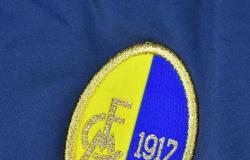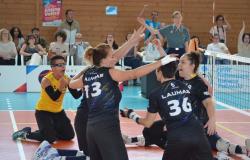Our column on Bari dei Bari has reached its sixteenth appointment. This, for me as I write, is a particular moment because I am interviewing my father: Gigi De Rosa. A true native of Bari who grew up in Catuzzi’s red and white youth team, he won the Coppa Italia Primavera as captain, scoring in the final against Milan. Nicknamed “Maradona” for his South American technique, gifted with imagination, he made his debut in the first team at 17 years old, in Serie B, thanks to mister Mimmo Renna in Bari-Palermo in the 1979-80 championship. In the sparkling 1981-82 season, in which the Galletti came close to Serie A and put on a show on the pitch, he was the offensive winger of Catuzzi’s 4-3-3 (35 appearances and 2 goals). He played with Bari until the 1983-84 championship (record year in the Italian Cup) in which with coach Bolchi he obtained promotion to Serie B and played in the semi-finals of the Italian Cup. He made a total of 86 appearances and 3 goals in the championship with the Bari shirt. In his career he played with Pescara (promotion to Serie A with Galeone), Cosenza (he is a member of the rossoblu), Matera (the team’s top scorer) and Castrovillari. Throughout his career, he has been able to play in all roles, becoming a true “wild card”. Having become a coach with top marks at the Coverciano master’s degree, at the age of 39 he coached Cosenza in Serie B, C and D (obtaining a miraculous salvation in Serie B 2001-02), Crotone, Pescara, Monopoli and Rende. Today, 61 years old, he is responsible for Rende’s youth sector and coach of the Under 17 students of the Calabrian team.
Bari’s Bari was something extraordinary, magical, which will remain forever imprinted in the minds and hearts of the fans. Even today, it is remembered as the most fascinating Bari in history.
So dad Gigi… what is the Bari of the people of Bari for you?
Advertising. Scroll to read more.
“A great group of eager and passionate boys who were hungry for football. We have created a precedent that is probably unique in the history of football. We really got the whole of Italy talking. We made history.”
Advertising. Scroll to read more.
Tell me some adjectives that represent that Bari…
“Fantastic because our way of playing and experiencing football, in the context of the time, was truly science fiction. Dominant because they put anyone down, leaving amidst thunderous applause even after a defeat. Beautiful, because it was a truly beautiful Bari to see.”
Advertisement. Continue to read more.
You were the captain of Catuzzi’s Primavera team that won the Italian Cup and beat the first team in a friendly…
“The Primavera was exceptional. It was Bari’s preview of the following Serie B season. In that year I scored around twenty goals between the championship and the Italian Cup, and took a lot of posts and crossbars. The captain’s armband I wore was also a role of responsibility that I have always had. In the final against Milan, we were up against players who have had a great career: Tassotti, Evani, Incocciati, Galli, Icardi, to name a few. Some AC Milan players of the time remember that match well, even though many years have passed. It looked like a professional football match: thousands of fans came to watch us. We played in blue shirts. At the end of the match we exchanged shirts with the Milan boys, and we wore them during the celebrations. There was great respect for the opponents, thanks also to coach Catuzzi who was a great teacher of football and life.”
At what age did you join Bari?
“At nine years old. They saw me playing on the street and took me to Bari. I played through the youth sector up to the first team. I played little for the Allievi because they immediately transferred me to the Primavera. I was also called up to Mr. Leali’s Puglia representative team and played in the national final at the ‘Olimpico’ stadium in Rome, on the same day as an important match for the national team; so I found myself on the pitch next to the blue champions. Under the presidency of De Palo we didn’t even have shoes, while when Matarrese arrived the youth sector had a great expansion and we kids had everything we needed.”
How did your red and white passion explode?
“I went to the stadium with my father since I was little. I went to cheer for Pasquale Loseto, Fasoli, Scarrone. In the meantime I was playing in the youth team and my dream was to play for Bari. I made it.”
In 1980 you were awarded at the prestigious Cuneo Tournament as the best player of the competition…
“It was a very important competition. We finished third and were eliminated by Juventus. I remember those moments well: I had a lot of fun, scoring good goals and numbers and managers from important clubs stopped me.”
Do you remember a particular episode?
“After a match played against Juventus ‘Primavera’, we remained stuck in the changing rooms for a long time, waiting to leave for Bari, because both the coach and the managers had disappeared. It was abnormal and I wondered what had happened. At a certain point they returned and I anticipated the coach by asking him what had happened. He said to me ‘Gigi, we were talking about you. Juve wants you and they were negotiating because they want you immediately. Would you like to stay here? At that moment, I said no.”
Did you regret that choice?
“No, because my dream was Bari. I couldn’t abandon the team. Over the years, however, I have wondered what my career would have been like if I had made that decision, which wasn’t the only one. I am satisfied with my career. Football has given me a lot, but I think I deserved it.”
You were a protagonist of that fantastic season of Serie B with Catuzzi. What was your best moment?
“The Rimini match. It seemed like we were playing at home, the Romagna stadium was packed with people from Bari (about ten thousand people from Bari in Rimini, ed.). I scored a lobbed goal and we won that important match which put us in the top positions in the standings.”
You were a protégé of Catuzzi, given that he also wanted you in Pescara in Serie B. What relationship did you have with him?
“Catuzzi was like a father. I owe everything to him, he was truly my teacher. When he left, I rushed to Parma for his funeral and I was very sick. Talking about it, he still makes me feel bad today. I had a great relationship with him. Sometimes, even though I was very young, he lent me his Mercedes and I fell in love with that car. In my life I have almost always had Mercedes.”
Your first car?
“At nineteen, the burgundy-black Charleston. Beautiful”.
What kind of boy was Gigi De Rosa? Also describe your technical characteristics…
“I have always been shy, reserved and very willing. I was immediately blessed with luck thanks to football, but I never let it go to my head. I made many sacrifices: at school I went to the ‘Santarella’ with my bag, because as soon as I left I took the bus for training. I played on the street and when I was very young I played matches in the Flacco square, on Corso Vittorio Veneto. Then at seven years old I moved to San Paolo with my family. I really liked dribbling and doing tricks, I was quick and had a good shot, having scored many goals from free kicks and from outside the area.”
Did you live in a large family?
“Yes, we were seven children and my parents made many sacrifices. With my first money as a footballer, I helped my family. I have two sons: Vincenzo and Marco, both with a huge passion for football.”
Your favourite dish?
“As a good native of Bari, I love seafood and fish. At home I practically grew up with anchovies and mussels, which my father put on the table practically every day. In Calabria I discovered chili pepper in many sauces and I can’t do without it.”
Your first goal with the Bari shirt?
“In Verona, in the splendid 1981-82 season: I scored a good header. The match ended 3-3 but we suffered refereeing injustices in that match too. When I returned home, they welcomed me like a hero in my neighborhood. I found friends, family and fans having a great party.”
Tell me an anecdote…
“In 1983 we played the round of 16 of the Italian Cup against the Juventus of Tardelli, Scirea, Paolo Rossi and Platini. At ‘Della Vittoria’ I made a good move on the wing and Cabrini and Furino fell to the ground due to my feints and dribbling. Furino (Juventus captain, ed.) got annoyed and made a somewhat harsh entrance to me. I took two posts and Zoff made a miraculous save on one of my shots. I still remember the roar of the audience who was thrilled during my actions.”
In Bari they nicknamed you ‘Maradona’. Then with Maradona you played against him several times…
“I played against Maradona first when I was in Pescara, and then when I played for Cosenza. It was precisely in a Napoli-Cosenza match played at the ‘San Paolo’ stadium that I asked him for the shirt and he, to my great surprise, told me ‘You eight Pescara’. Six years had passed since the first time we faced each other as opponents, but he remembered me with great clarity, even the shirt number I was wearing (number 8, ed.). He told me that he had already promised me the shirt and that he would give it to me in the return match. On his return, however, he was injured and Zola played in his place with number 10. At the end of the match, while I was lying on the bed in the locker room, Gianfranco Zola reached me and said ‘Gigi, Diego sent you this’. Maradona was great not only as a footballer.”
The news of the time considered you a top player for Bari. Valcareggi, coach of the Under 21 national team, said that you were a natural talent…
“I was often called up to the Under 21 B team by Ferruccio Valcareggi and I also played there. Vicini, on the other hand, often called me up to the Under 21 national team for rallies. He told me that he would take me with the Under 21 team to the 1984 Olympics, but that year I played in Serie C with Bari and everything was cancelled. One day Vicini called home and told me that if he had let a B player play there would have been a mess. Before, only those from the big Serie A teams played in the national team, and I played in Serie B with Bari. But for me it was a great satisfaction.”
The best goal of your career?
“With the Pescara shirt I scored a headed goal from almost midfield in the derby against Sambenedettese. With a minute to go I scored the only zero and the stadium exploded. It was a very particular and unusual goal, perhaps a record. A national newspaper published a cartoon the next day.”
You scored a goal with Matera in 1993-94, in the derby against Potenza. A penalty with the “spoon”. You did it long before Totti of Roma…
“I’ve done it several times in my career. Yes, it’s true, I did it before Totti but I don’t think Francesco copied from me. They are beautiful memories.”
Do you have a regret in your career?
“Maybe my somewhat shy character didn’t make me stand out more than I could, but I’m happy. I had many proposals, but when I felt comfortable in the club I played with, I didn’t want to leave it. I am one of the players in history with the most appearances in Serie B.”
What do you think of this negative season for the red and whites?
“Bari didn’t start very well this year and over time they haven’t managed to change gear. When you change so many coaches it means that there are problems. Football is not a science. The season with Catuzzi, for example, was splendid but the following year we were relegated to Serie C. Well, this is football too. But I absolutely didn’t expect such a negative season. I’m experiencing it very badly because I have Bari in my heart.”
You are a coach and you have coached in Serie B, offending important savers. Do you think Bari will be able to survive the playouts against Ternana?
“It will be difficult because the Breda team has one result out of two, but what counts above all is motivation. In this last match of the playouts you have to give everything you have. Episodes and luck will also make the difference, as happens in life. But Bari must also look for luck.”
Is the Bari of Bari unrepeatable?
“Yes. Today’s kids want everything immediately and are not predisposed to real sacrifices. We played in the street. I think schools also dedicate little time to physical activity. In Nordic countries, for example, they dedicate many hours a week to sport. Times may have changed, but football and its dynamics have also changed a lot. I had the dream of playing only for Bari.”
Advertising. Scroll to read more.







